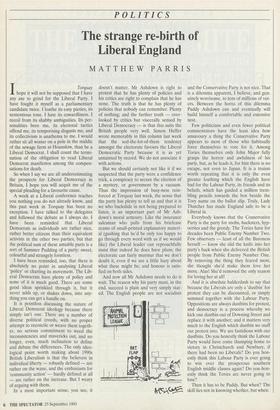POLITICS
The strange re-birth of Liberal England
MATTHEW PARRIS
So when I say we are all underestimating the prospects for Liberal Democracy in Britain, I hope you will acquit me of the special pleading for a favourite cause.
A week at a Liberal conference teaches you nothing you do not already know, and this past week in Torquay has been no exception. I have talked to the delegates and followed the debate as I always do. I have been reminded that Liberal Democrats as individuals are rather nice, rather better citizens than their equivalent activists in the other two parties, but that the political sum of these amiable parts is a sort of Summer Pudding of a party: sweet, colourful and strangely formless.
I have been reminded, too, that there is absolutely no point in analysing Liberal 'policy' or charting its movement. The Lib- eral Democrats have plenty of policy and none of it is much good. There are some good ideas sprinkled through it, but it never adds up, or shakes down, into any- thing you can get a handle on.
It is pointless discussing the nature of Liberal Democrat ideology because there simply isn't one. There are a number of diverse political creeds, with no proper attempt to reconcile or weave them togeth- er, no serious commitment to weed the inconsistencies and mavericks out, and no longer, even, much inclination to define and debate the differences. The only ideo- logical point worth making about 1990s British Liberalism is that the believers in individual liberty — robustly defined — are rather on the wane, and the enthusiasts for 'community action' — hardly defined at all — are rather on the increase. But I weary of arguing with them.
In a most important sense, you see, it doesn't matter. Mr Ashdown is right to protest that he has plenty of policies and his critics are right to complain that he has none. The truth is that he has plenty of policies that nobody can remember. Plenty of nothing; and the further truth — over- looked by critics but viscerally sensed by Liberal Democracy — is that this suits the British people very well. Simon Heifer wrote memorably in this column last week that the sod-the-lot-of-them tendency amongst the electorate favours the Liberal Democratic Party because it is as yet untainted by record. We do not associate it with actions.
But we should certainly not like it if we suspected that the party were a confidence trick, a conspiracy to secure the election of a mystery, or government by a vacuum. Thus the impression of busy-ness rein- forced at Torquay last week, the sense that the party has plenty to tell us and that it is we who backslide in not being prepared to listen, is an important part of Mr Ash- down's moral armoury. Like the insurance salesman who pulls from his briefcase reams of small-printed explanatory materi- al (gushing that he'd be only too happy to go through every word with us if we would like) the Liberal leader can reproachfully insist that indeed he does have plans; the electorate can fairly murmur that we don't doubt it, even if we are a little hazy about what these might be; and honour is satis- fied on both sides.
And now all Mr Ashdown needs to do is wait. The reason why his party must, in the end, succeed is plain and very simply stat- ed. The English people are not socialists
and the Conservative Party is not nice. That is a dilemma apparent, I believe, and gen- uinely worrisome, to tens of millions of vot- ers. Between the horns of this dilemma Paddy Ashdown can and eventually will build himself a comfortable and extensive nest.
Few politicians and even fewer political commentators have the least idea how unsavoury a thing the Conservative Party appears to most of those who habitually force themselves to vote for it. Among Tories themselves only John Major fully grasps the horror and awfulness of his party, but, as he leads it, for him there is no escape, not even to Japan. It is a truism worth repeating that it is only the even greater loathing which the English have had for the Labour Party, its friends and its beliefs, which has guided a million trem- bling pencils towards the box beside the Tory name on the ballot slip. Truly, Lady Thatcher has made England safe to be a Liberal in.
Everybody knows that the Conservative Party is the party for snobs, hucksters, hyp- ocrites and the greedy. The Tories have for decades been Public Enemy Number Two. Few observers — least of all the Baroness herself — know she slid the knife into her party's back when she delivered the British people from Public Enemy Number One. By removing the thing they feared most, she thought she'd make them love her more. Alas! She'd removed the only reason for loving her at all!
And it is absolute balderdash to say that because the Liberals are only a 'dustbin' for protest they can be discounted, or simply summed together with the Labour Party. Oppositions are always dustbins for protest, and democracy is a process whereby we kick one dustbin out of Downing Street and replace it with another; and it matters very much to the English which dustbin we stuff our protest into. We are fastidious with our dustbins. Do you honestly think the Labour Party would have come thumping home to victory in Christchurch and Newbury, if there had been no Liberals? Do you hon- estly think this Labour Party is ever going to win over the prosperous southern English middle classes again? Do you,hon- estly think the Tories are never going to lose?
Then it has to be Paddy. But when? The skill lies not in knowing whether, but when.


























































 Previous page
Previous page